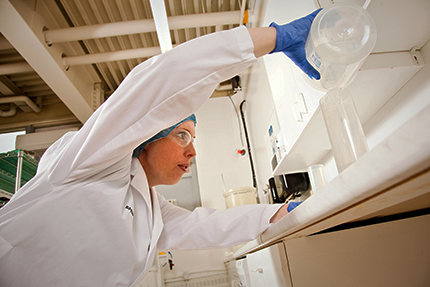THE CHRONICLE HERALD: Help for anxiety a click away with Tranquility Online
Read full Chronicle Herald article here Tranquility Online is an online application those with anxiety can use to manage their symptoms. And it all started with one Facebook post its Halifax co-founder and CEO wrote in 2016. Joel Muise was first diagnosed with general anxiety and depression in his last year of high school. He was working as a stock analyst when he wrote that post in 2016. There he shared his story of living with anxiety. Immediately, he got a response from a friend who saw themselves in Muise’s story. “I was really surprised by his response,” Muise says. “If that was the response I got from him, I thought I should share the whole story. In 48 hours, 4,000 people had read and shared it.”]]>
BioMedica Diagnostics Inc. Cornering the global market for blood testing kits
See original article on the Canadian Trade Commissioner Service Website BioMedica Diagnostics Inc. is well established as an exporter, with almost 100 percent of the sales of its blood coagulation testing kits, reagents and other products in more than 70 countries around the world.
 (Photo: BioMedica Diagnostics Inc.)
(Photo: BioMedica Diagnostics Inc.)
Tips for life sciences companies looking to go global
Exporters looking to aggressively extend their global reach in a field such as medical devices need passion, drive and a good business plan that ensures they don’t over extend, the experts say. “The realistic thing is how much business can a company handle,” says Butch Postma, a trade commissioner who covers the life sciences sector in Atlantic Canada and is based in Charlottetown. “It’s a work in progress with all clients.” Companies looking at international markets have various support partners at home to assist with export readiness, Postma says. “As clients carry out their due diligence on potential markets, an excellent first step for them is to leverage the domestic TCS network in Canada.” The company’s information is verified in a client management system, he says, making the client aware of the TCS’s service offerings and carrying out an introduction to TCS officers abroad. “This is all part of the beginning steps as we support the client with a recommended strategy, contacts and focused intelligence for the market or markets identified.” The biggest challenge for small and medium enterprises (SMEs) is to get themselves known to new customers, he says, noting that many also “fall down on not following up” once they’ve made initial contacts. “Sometimes you have the president of the company who’s also the marketing guy, who’s also the finance guy. And when he gets back to the office the international business component takes a backseat, because there’s other things that demand his attention.” Aurora Polo, a trade commissioner in Barcelona whose responsibilities include Spain’s life sciences and health industries sector, says the best market-entry strategy for Canadian medical devices or diagnostics SMEs is “to identify a good distributor or commercial partner with the right knowledge of the market and industry sector.” It’s important for a potential partner to have contacts in both the public and private health-care sectors, with expertise in the regulatory framework for such devices. It’s also critical to have appropriate knowledge of the bid procurement structure and processes at the local, regional, national and international level. Having the right contacts and being able to provide adequate technical support are key, she says. “Visiting the market is also a must, as personal relations are important to establish long-standing solid business relations with distributors and commercial partners.”First Patient Dosed in Phase 1 Clinical Trial Evaluating Neoepitopes Formulated in IMV’s DPX Delivery Platform in Ovarian Cancer Patients
DARTMOUTH, Nova Scotia, Jan. 17, 2019 (GLOBE NEWSWIRE) — IMV Inc. (Nasdaq: IMV; TSX: IMV), a clinical stage immuno-oncology corporation, today announced that the first patient has been treated in the Phase 1 trial evaluating neoepitopes formulated in the Company’s proprietary DPX delivery platform in patients with ovarian cancer. The study is part of the Company’s DPX-NEO program, which is an ongoing collaboration between UConn Health and IMV to develop neoepitope-based anti-cancer therapies.
“Expanding our DPX-based clinical immunotherapy program beyond DPX-Survivac is an important milestone for IMV, and we are pleased to be able to do so with this type of cutting-edge program in which the novel mechanism of action underscoring all DPX-based candidates plays a critical role,” said Frederic Ors, Chief Executive Officer at IMV. “We believe that the potential of neoepitope-based therapies could be a significant advance in the way physicians treat patients with ovarian cancer who today face a high unmet medical need. We look forward to working with UConn Healthto advance this program as IMV is committed to developing an immunotherapy option for women affected by this disease.”
Investigators will assess the safety and efficacy of using patient-specific neoepitopes discovered at UConn Health and formulated in IMV’s proprietary DPX-based delivery technology in women with ovarian cancer. Investigators plan to enroll up to 15 patients in the Phase 1 study. UConn Health is funding the trial with IMV providing materials and counsel.
Epitopes are the part of the biological molecule that is the target of an immune response. Neoepitopes are the mutated proteins produced by a patient’s own tumors. Neoepitope immunotherapies target these patient-specific proteins and have been referred to as ‘the next immunotherapy frontier.’ (1)
“The first immunization of the first ovarian cancer patient with our personalized, patient-specific neoepitopes developed at the University of Connecticut using our proprietary technology, formulated in IMV’s excellent immunomodulatory DPX delivery platform, is a major milestone for us,” said Study Investigator Pramod K Srivastava, PhD, MD, Director of the Neag Comprehensive Cancer Center at the University of Connecticut School of Medicine.
About the DPX-NEO Program
The DPX-NEO program is an ongoing collaboration evaluating the anti-cancer activity of proprietary patient-specific epitopes developed at UConn Health and formulated in IMV’s DPX-based novel immunotherapeutic delivery technology. IMV had previously announced the results from preclinical research in which researchers at UConn found that neoepitopes formulated in DPX-based formulations demonstrated superior immunogenic activity over comparators in mouse tumor models. In addition, IMV also previously announced a breakthrough in formulating multiple peptides in DPX formulations. The Company has patented the technology, which allows for both a larger number and a broader potential range of peptides into a single formulation as compared to standard formulation technologies.
About IMV
IMV Inc. is a clinical stage biopharmaceutical company dedicated to making immunotherapy more effective, more broadly applicable, and more widely available to people facing cancer and other serious diseases. IMV is pioneering a new class of immunotherapies based on the Company’s proprietary drug delivery platform. This patented technology leverages a novel mechanism of action that enables the programming of immune cells in vivo, which are aimed at generating powerful new synthetic therapeutic capabilities. IMV’s lead candidate, DPX-Survivac, is a T cell-activating immunotherapy that combines the utility of the platform with a target: survivin. IMV is currently assessing DPX-Survivac as a monotherapy in advanced ovarian cancer, as well as a combination therapy in multiple clinical studies with Incyte and Merck. Connect at www.imv-inc.com.
IMV Forward-Looking Statements
This press release contains forward-looking information under applicable securities law. All information that addresses activities or developments that we expect to occur in the future is forward-looking information. Forward-looking statements are based on the estimates and opinions of management on the date the statements are made. However, they should not be regarded as a representation that any of the plans will be achieved. Actual results may differ materially from those set forth in this press release due to risks affecting the Corporation, including access to capital, the successful completion of clinical trials and receipt of all regulatory approvals. IMV Inc. assumes no responsibility to update forward-looking statements in this press release except as required by law. These forward-looking statements involve known and unknown risks and uncertainties and those risks and uncertainties include, but are not limited to, our ability to access capital, the successful and timely completion of clinical trials, the receipt of all regulatory approvals and other risks detailed from time to time in our ongoing quarterly filings and annual information form Investors are cautioned not to rely on these forward-looking statements and are encouraged to read IMV’s continuous disclosure documents, including its current annual information form, as well as its audited annual consolidated financial statements which are available on SEDAR at www.sedar.com and on EDGAR at www.sec.gov/edgar.
Contacts for IMV:
MEDIA
Andrea Cohen, Sam Brown Inc.
T: (917) 209-7163 E: [email protected]
INVESTOR RELATIONS
Marc Jasmin, IMV Senior Director, Investor Relations
T: (902) 492-1819 E: [email protected]
Patti Bank, Managing Director, Westwicke Partners
O: (415) 513-1284
T: (415) 515-4572 E: [email protected]
REFERENCES
1 Neoepitope Vaccines, Next Immunotherapy Frontier Cancer Discovery Published Online First December 28, 2015; doi:10.1158/2159-8290.CD-NB2015-179
![]()
Source: IMV Inc.
Province Announces Innovation Equity Tax Credit
Nova Scotia startup companies and small and medium-sized businesses will benefit from more investment, thanks to a new Innovation Equity Tax Credit launched today by Finance and Treasury Board Minister Karen Casey.
The new tax credit applies to investments up to $250,000 in eligible businesses, which is $200,000 more than the current Equity Tax Credit. Nova Scotian investors will receive a tax incentive of 35 per cent, or 45 per cent in priority sectors of oceans technology and life sciences.
“This new tax credit encourages Nova Scotians to invest in our home-grown entrepreneurs and local companies so they can drive growth, be more competitive and succeed,” said Ms. Casey. “It will add to our ongoing efforts to improve the business climate in Nova Scotia for innovation-driven entrepreneurship by doing things differently to support economic growth.”
The revised regulations outline that Nova Scotia businesses less than 10 years old may qualify for funding. Investors often bring expertise, advice, mentoring and networks to the businesses they have invested in.
The province is also exploring options to expand the tax credit through legislation this spring. Those options include making corporations and qualified venture capital funds eligible for the credit.
The new tax credit focuses on innovation-driven entrepreneurship and narrows business eligibility to priority areas. The current equity tax credit, established in 1994, will be phased out as part of the 2019-20 Budget, to enable time for businesses to adjust.
The new tax credit is effective immediately. To view the regulations visit, https://novascotia.ca/just/regulations/rxaa-l.htm#inctax .
FOR BROADCAST USE:
Nova Scotia startups will benefit from a new Innovation Equity Tax Credit that encourages more local investment.
The new tax credit focuses on innovation-driven entrepreneurship and narrows business eligibility to priority areas, including ocean technology and life sciences.
Finance and Treasury Board Minister Karen Casey says new investments in local companies will help to create a stronger Nova Scotia.
This will help build on the flourishing startup community we have in the province.
The new tax credit is effective immediately.
Media Contact:
- Gary Andrea
- 902-456-6196 Email: gary.andrea@novascotia.ca


